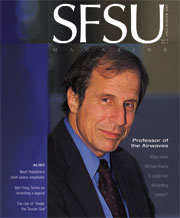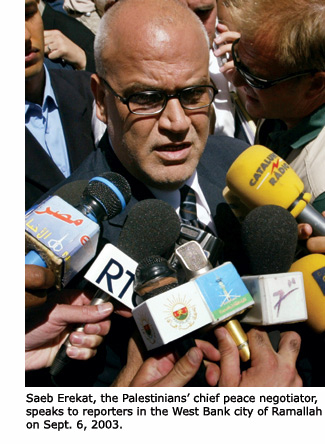 |
| |||
Forging a Path to Peace It is a Sunday in early fall and the Israelis have just retaliated for the deadly attack at a Haifa restaurant with air assaults on Syria and Gaza. From CNN to the BBC to Al-Jazeera, Erekat condemns the suicide bombing while calling on the United States to de-escalate tensions. In his dozen years as a negotiator with Israel, the 48-year-old Erekat -- his dark hair now white and his bespectacled eyes rimmed by dark circles -- has emerged for many as the public face and voice of the Palestinian cause. With Arafat under virtual house arrest in his Ramallah compound, it is this former university professor and journalist whom the western media turn to first for the Palestinian viewpoint. In accented but flawless English, Erekat delivers concise and sharp-tongued comments with such speed that it is hard for reporters to keep up. "He is a very effective spokesman for the Palestinian Authority, especially in the West, because he speaks great English and his mouth can keep up with his brain," said John Ward Anderson, who covers the Middle East for The Washington Post. But it is Erekat’s behind-closed-doors role as peace negotiator that consumes him. Tapped by Arafat in 1991 to head the Palestinian delegation to the Madrid peace talks, Erekat has since sat at the table for nearly every session with the Israelis. He helped craft the 1993 Oslo Accords and took part in the Camp David talks in 1995. The Bush administration mostly shuns Arafat, so it was Erekat, said to be a loyal ally of the Palestinian president, who met last fall with the U.S. Middle East peace envoy, John Wolf. That Erekat is still in the negotiation business at all is somewhat surprising given that he quit his post in May. The press reported that he walked away in a huff after Mahmoud Abbas, then the new Palestinian prime minister, excluded Erekat from talks with Israeli Prime Minister Ariel Sharon, possibly in a bid to set himself apart from Arafat. Erekat says the truth is that he was fed up and full of despair. "I was asking myself the question, couldn’t I have done something different? For someone to ask that question every minute of every day, 365 days a year, it’s too painful," Erekat said in a telephone interview from his home in the West Bank city of Jericho. Whatever the reason, Erekat’s absence was brief. Two months after he quit, Abbas persuaded him to return. In November, Abbas’ replacement, Ahmed Qureia, named Erekat a minister in his newly formed cabinet, with responsibility for negotiations with Israel. Erekat is also a Palestinian legislator. He represents Jericho, the small town in the Jordan Valley where he lives with his wife, Nemaeh, and the younger two of the couple’s four children in the stone-walled home where he was born and raised. Considered part of the moderate wing of Palestinian leadership, Erekat supports establishment of an independent Palestinian state alongside Israel and a complete Israeli withdrawal from Palestinian territory occupied since 1967. The Boston Globe has called him a "favored interlocutor for Israelis" and he reportedly takes a pragmatist’s approach at the negotiating table. "The important thing to remember about Saeb Erekat is that he is a tough, very strong Palestinian nationalist, but he is also very committed to a peaceful resolution of this conflict," said Ambassador Philip Wilcox Jr., president of the Washington, D.C.-based Foundation for Middle East Peace and the State Department’s chief of mission in Jerusalem from 1988-1991. Erekat has been a strong supporter of the U.S.-backed peace plan known as the road map, which many Middle East experts now believe is dead. During his hiatus from negotiations, Erekat conceded as much. More recently, though, he seemed to cling to hope. The road map "is the only thing on the table that can save the lives of Israelis and Palestinians and revive the peace process," said Erekat, a sense of urgency in his voice. "It’s up to President Bush to keep it alive." Comments like that inflame critics who blame stalled peace negotiations less on the White House than on the failure of Palestinian leadership to end the suicide bombings that have killed hundreds of Israeli civilians since the start of the second intifada three years ago. When asked whether he could do more to halt the carnage, Erekat said he condemns but cannot stop the bombings. "The only way to stop them is through a meaningful peace process," he said. "As a Palestinian father, I want my children to be journalists and schoolteachers and professors and musicians. I don’t want them to be suicide bombers. But in order to do so, I need to provide hope that they will live in freedom away from occupation." The Israeli occupation of the West Bank began when Erekat was on the cusp of adolescence and informed his early attitudes toward Israel. The sixth of seven children of Jerusalem-born parents, his father ran a bus company that was destroyed during the 1967 war, when Israel captured the West Bank. "There was no such thing as insurance against wars, so my father lost everything," Erekat said. In anger, the teenaged Erekat joined Palestinian youth who spray-painted anti-Israeli graffiti and threw rocks at Israeli soldiers. In 1972, Erekat followed an older brother to San Francisco to attend college. After two years at City College of San Francisco, he transferred to San Francisco State, where he supported himself working nights behind the counter at a Palestinian-owned delicatessen. An international relations major with an ardent interest in Middle East politics, Erekat became active in the Arab Students Association. He put himself up for president and won. Erekat stayed on after graduation in 1977 to earn a master’s degree, also in international relations. He won two teaching assistantships and remains in touch today with both professors for whom he worked -- the Middle East expert Dwight Simpson and JoAnn Aviel, now chair of the International Relations Department. His campus politicking notwithstanding, Erekat had in mind for himself a career in academics. After returning home in 1979, he got a teaching job at An-Najah National University at Nablus on the West Bank but soon won a scholarship to a doctoral program at England’s University of Bradford. He settled in at the university’s respected Department of Peace Studies, picking conflict resolution as the subject of his Ph.D. He said it was here that he became convinced that the Israeli-Palestinian conflict would end only through peaceful means. His Ph.D. in hand, Erekat returned to An-Najah University. Seeking a broader audience for his pro-peace message, he began writing op-ed pieces and news articles for the West Bank daily Al-Quds. In 1982, he penned an article calling for a dialogue between Palestinian and Israeli academics. The piece provoked an explosion of anger on the An-Najah campus. Students boycotted his classes and staged angry demonstrations in which they accused the professor of betraying the cause, which they believed to be one of confrontation rather than conciliation. Undeterred, Erekat invited Israeli university students to visit his Nablus classroom. This time, attacks came from both sides. Palestinian students distributed leaflets accusing Erekat of treason while an Israeli army commander warned him not to play Israeli against Israeli. Erekat said he told the commander: "To hell with them and to hell with you. I will continue this. Nobody will intimidate me." As Erekat continued agitating for peace, his reputation grew. In 1991, a friend passed him a note from Arafat asking Erekat to join the Palestinians at the Madrid peace conference as deputy head of delegation. After initially refusing, Erekat agreed. Erekat’s name has been bandied about in the press as a possible successor to the enfeebled Arafat. For now, he says, he remains committed to his role as negotiator and insists he has not given up hope. "I think Palestinians and Israelis are destined to live in peace. I think one day the occupation will end and the Israelis will stop being our occupiers and become our neighbors and there’ll be a Palestinian state next to the state of Israel," he said. "That’s what I commit my life to achieve." -- Anne Burke | ||||










